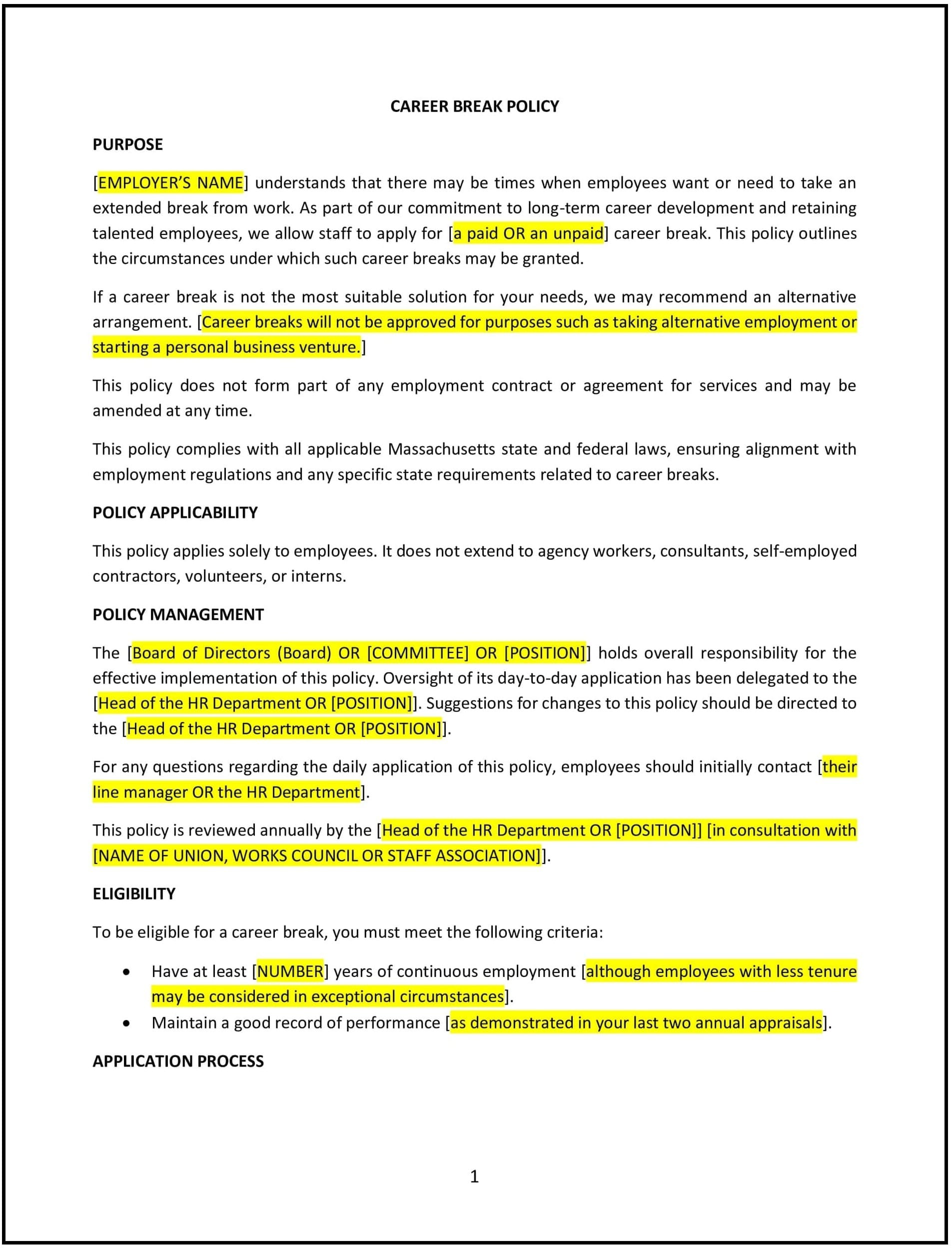Got contracts to review? While you're here for policies, let Cobrief make contract review effortless—start your free review now.

Customize this template for free
This career break policy is designed to help Massachusetts businesses establish clear guidelines for employees who wish to take an extended break from work for personal reasons. The policy outlines the procedures for requesting a career break, the eligibility criteria, the duration of the break, and any benefits or compensation available during the leave. The policy also addresses job protection and the employee’s rights to return to their position after the break.
By adopting this policy, businesses can offer employees the flexibility to manage personal commitments, reduce burnout, and retain valuable talent while ensuring that business operations continue smoothly.
How to use this career break policy (Massachusetts)
- Define eligibility criteria: Clearly specify which employees are eligible for a career break, including factors such as length of service, role, and the nature of the personal reason for the break (e.g., personal development, family care, health reasons). The policy should also outline any exclusions or specific conditions for eligibility.
- Set the duration of the break: Specify the maximum duration for a career break, typically ranging from a few months to one year. The policy should define whether the break is paid or unpaid and if any compensation, benefits, or support are provided during the break.
- Outline the application process: Establish a clear process for requesting a career break, including how much notice employees must provide, the format of the request (e.g., written request), and any necessary documentation or justification for the break.
- Address job protection: Specify whether the employee is guaranteed the right to return to their role after the career break. The policy should clarify whether employees will return to the same position or a similar one, and if there are any conditions on job protection (e.g., the company’s operational needs may affect job availability).
- Define expectations during the break: Outline any expectations for employees during their career break, such as restrictions on taking on other employment, checking in with the company periodically, or notifying the company if their situation changes.
- Address the continuation of benefits: Specify whether employee benefits, such as health insurance or retirement contributions, will continue during the career break, and if so, under what conditions (e.g., the employee may be required to pay a portion of the premiums for continued coverage).
- Provide for return to work: Clearly state the expectations for employees returning to work, including how much notice is required before returning, any required documentation (e.g., medical clearance if the break was for health reasons), and how the company will facilitate the reintegration process.
- Ensure compliance with Massachusetts and federal laws: Ensure the policy complies with Massachusetts state laws, such as the Massachusetts Paid Family and Medical Leave (PFML) law, and federal regulations regarding employee leave and job protection.
Benefits of using this career break policy (Massachusetts)
This policy offers several benefits for Massachusetts businesses:
- Retains valuable talent: By offering career breaks, businesses can retain valuable employees who might otherwise leave due to personal commitments, reducing turnover and associated recruitment costs.
- Increases employee satisfaction: Providing employees with the option to take time off for personal reasons demonstrates that the company values work-life balance and can increase overall job satisfaction and morale.
- Reduces burnout: Career breaks allow employees to step away from work and recharge, which can reduce stress and burnout, leading to improved long-term productivity and job performance.
- Supports diversity and inclusion: A flexible career break policy can support employees with caregiving responsibilities, health issues, or personal development goals, fostering a more inclusive and diverse workplace.
- Enhances employer brand: Offering career breaks as part of a comprehensive benefits package can enhance the company’s reputation as an employer of choice, attracting top talent who value flexibility and work-life balance.
- Ensures legal compliance: By adhering to Massachusetts state laws and federal regulations, the policy helps businesses mitigate the risk of legal disputes related to employee leave and job protection.
Tips for using this career break policy (Massachusetts)
- Communicate the policy clearly: Ensure that all employees are aware of the career break policy, including eligibility requirements, the application process, and any impact on their compensation, benefits, or job protection.
- Be flexible in approval: While the policy should set clear guidelines, consider being flexible in approving career breaks, particularly if an employee has a compelling reason for the leave.
- Monitor employee reintegration: Ensure that employees who return from a career break are reintegrated smoothly into the workplace. This may involve a transition plan to help them catch up on any changes or developments that occurred during their absence.
- Provide support during the break: Stay in touch with employees on a periodic basis to offer support or address any concerns they may have during the break. This can help maintain positive relationships and ensure that employees feel supported during their time off.
- Review and update regularly: Periodically review the policy to ensure it is compliant with Massachusetts state laws, federal regulations, and any changes in business needs. Update the policy as necessary to address evolving employee needs and operational changes.